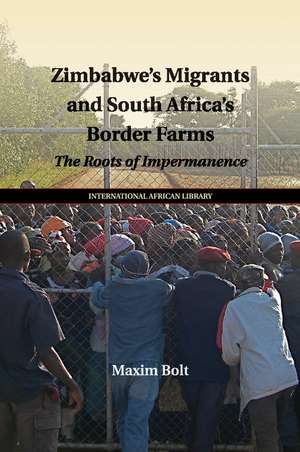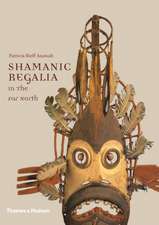Zimbabwe's Migrants and South Africa's Border Farms: The Roots of Impermanence: The International African Library, cartea 50
Autor Maxim Bolten Limba Engleză Paperback – 31 mai 2017
| Toate formatele și edițiile | Preț | Express |
|---|---|---|
| Paperback (1) | 285.54 lei 6-8 săpt. | |
| Cambridge University Press – 31 mai 2017 | 285.54 lei 6-8 săpt. | |
| Hardback (1) | 695.93 lei 6-8 săpt. | |
| Cambridge University Press – 24 sep 2015 | 695.93 lei 6-8 săpt. |
Din seria The International African Library
-
 Preț: 230.10 lei
Preț: 230.10 lei -
 Preț: 230.79 lei
Preț: 230.79 lei -
 Preț: 229.90 lei
Preț: 229.90 lei - 9%
 Preț: 592.46 lei
Preț: 592.46 lei -
 Preț: 282.48 lei
Preț: 282.48 lei -
 Preț: 264.64 lei
Preț: 264.64 lei -
 Preț: 202.36 lei
Preț: 202.36 lei - 11%
 Preț: 583.36 lei
Preț: 583.36 lei - 14%
 Preț: 891.04 lei
Preț: 891.04 lei - 11%
 Preț: 636.34 lei
Preț: 636.34 lei -
 Preț: 226.17 lei
Preț: 226.17 lei -
 Preț: 285.37 lei
Preț: 285.37 lei -
 Preț: 323.27 lei
Preț: 323.27 lei -
 Preț: 289.01 lei
Preț: 289.01 lei -
 Preț: 326.15 lei
Preț: 326.15 lei -
 Preț: 287.66 lei
Preț: 287.66 lei -
 Preț: 288.25 lei
Preț: 288.25 lei -
 Preț: 285.54 lei
Preț: 285.54 lei -
 Preț: 306.47 lei
Preț: 306.47 lei -
 Preț: 285.75 lei
Preț: 285.75 lei -
 Preț: 284.17 lei
Preț: 284.17 lei -
 Preț: 285.37 lei
Preț: 285.37 lei -
 Preț: 283.03 lei
Preț: 283.03 lei -
 Preț: 279.76 lei
Preț: 279.76 lei -
 Preț: 281.30 lei
Preț: 281.30 lei -
 Preț: 282.48 lei
Preț: 282.48 lei -
 Preț: 213.63 lei
Preț: 213.63 lei - 11%
 Preț: 585.59 lei
Preț: 585.59 lei
Preț: 285.54 lei
Nou
Puncte Express: 428
Preț estimativ în valută:
54.66€ • 59.39$ • 45.94£
54.66€ • 59.39$ • 45.94£
Carte tipărită la comandă
Livrare economică 21 aprilie-05 mai
Preluare comenzi: 021 569.72.76
Specificații
ISBN-13: 9781107527836
ISBN-10: 110752783X
Pagini: 268
Ilustrații: 24 b/w illus. 2 maps
Dimensiuni: 153 x 230 x 16 mm
Greutate: 0.4 kg
Editura: Cambridge University Press
Colecția Cambridge University Press
Seria The International African Library
Locul publicării:New York, United States
ISBN-10: 110752783X
Pagini: 268
Ilustrații: 24 b/w illus. 2 maps
Dimensiuni: 153 x 230 x 16 mm
Greutate: 0.4 kg
Editura: Cambridge University Press
Colecția Cambridge University Press
Seria The International African Library
Locul publicării:New York, United States
Cuprins
1. Introduction; 2. 'It's in our blood, it's in our skin'; 3. Behind the mountain; 4. Producing permanence; 5. Reimagining men; 6. 'Management' or 'paternalism?'; 7. Scaling up; 8. Conclusion.
Recenzii
'This closely attentive ethnography of a particular border farm in the new South Africa adds remarkable experiential and cultural depth to the understanding of migrant farm workers, as they manage and conceptualize work, time, money and relationships in their intimate lives, on and off the farm.' Jane I. Guyer, The Johns Hopkins University
'In precise, limpid prose, Maxim Bolt brings to life the human ecology of a border farm. Ever alert to the counter-intuitive, he shows how stability is fashioned in the midst of the unstable, and how work organises life in a time of mass unemployment. The monograph sheds light on new and important social processes. It is a significant achievement.' Jonny Steinberg, author of A Man of Good Hope
'An extremely well-written ethnography which engages with relevant theoretical analyses of migration, borders, capitalism, labour and work. Bolt demonstrates great scholarship and speaks to a range of academic fields: anthropology, sociology, political economy, migration and development studies. It will be of great interest to scholars of southern Africa.' Blair Rutherford, Carleton University, Ottawa
'A thoughtfully structured and beautifully written manuscript which does justice to a very complex set of dynamics in Zimbabwe and across the borders. It deserves to be widely read and appreciated. Graduate students from a range of disciplines would be particularly able to relate to this material. The book is at a unique intersection of a number of scholarly fields, namely labour studies, agrarian studies, border studies, displacement and migration studies besides the broader discipline of economic anthropology.' Amanda Hammar, University of Copenhagen
'Separated into eight chapters and based upon both archival work and interviews with various farm personnel, ranging from fruit pickers, to foremen, office staff, and the farm owners and their families, Bolt has been able to demonstrate the sheer degree of complexity and interaction that exists in such settings. … It is the examination of this populace and the various interactions they have within Grootplaas that is one of the greatest strengths of Bolt's monograph. Through living on the farm himself, and serving as part of a fruit picking team during the annual harvest, the author has gained unprecedented access to communities that have previously been closed to academics. … this is a very strong monograph.' Richard Daglish, Reviews in History
'Maxim Bolt's beautifully written ethnography takes us on a journey into the lives of white commercial farmers and their employees in the remote Limpopo Valley. … Bolt's work contributes a nuanced analysis of the intersection between personhood and workforce membership in a context of political and economic precarity. Leila Sinclair-Bright, African Studies Review
'… an interesting and inspiring book that offers a range of insights for scholars concerned with border economies, labour migration, masculinity, the anthropology of agriculture and South African studies.' Sylvia Meichsner, Journal of Borderlands Studies
'In precise, limpid prose, Maxim Bolt brings to life the human ecology of a border farm. Ever alert to the counter-intuitive, he shows how stability is fashioned in the midst of the unstable, and how work organises life in a time of mass unemployment. The monograph sheds light on new and important social processes. It is a significant achievement.' Jonny Steinberg, author of A Man of Good Hope
'An extremely well-written ethnography which engages with relevant theoretical analyses of migration, borders, capitalism, labour and work. Bolt demonstrates great scholarship and speaks to a range of academic fields: anthropology, sociology, political economy, migration and development studies. It will be of great interest to scholars of southern Africa.' Blair Rutherford, Carleton University, Ottawa
'A thoughtfully structured and beautifully written manuscript which does justice to a very complex set of dynamics in Zimbabwe and across the borders. It deserves to be widely read and appreciated. Graduate students from a range of disciplines would be particularly able to relate to this material. The book is at a unique intersection of a number of scholarly fields, namely labour studies, agrarian studies, border studies, displacement and migration studies besides the broader discipline of economic anthropology.' Amanda Hammar, University of Copenhagen
'Separated into eight chapters and based upon both archival work and interviews with various farm personnel, ranging from fruit pickers, to foremen, office staff, and the farm owners and their families, Bolt has been able to demonstrate the sheer degree of complexity and interaction that exists in such settings. … It is the examination of this populace and the various interactions they have within Grootplaas that is one of the greatest strengths of Bolt's monograph. Through living on the farm himself, and serving as part of a fruit picking team during the annual harvest, the author has gained unprecedented access to communities that have previously been closed to academics. … this is a very strong monograph.' Richard Daglish, Reviews in History
'Maxim Bolt's beautifully written ethnography takes us on a journey into the lives of white commercial farmers and their employees in the remote Limpopo Valley. … Bolt's work contributes a nuanced analysis of the intersection between personhood and workforce membership in a context of political and economic precarity. Leila Sinclair-Bright, African Studies Review
'… an interesting and inspiring book that offers a range of insights for scholars concerned with border economies, labour migration, masculinity, the anthropology of agriculture and South African studies.' Sylvia Meichsner, Journal of Borderlands Studies
Notă biografică
Descriere
This book addresses the complex labour and life conditions faced by workers in the agricultural borderlands of northern South Africa.














